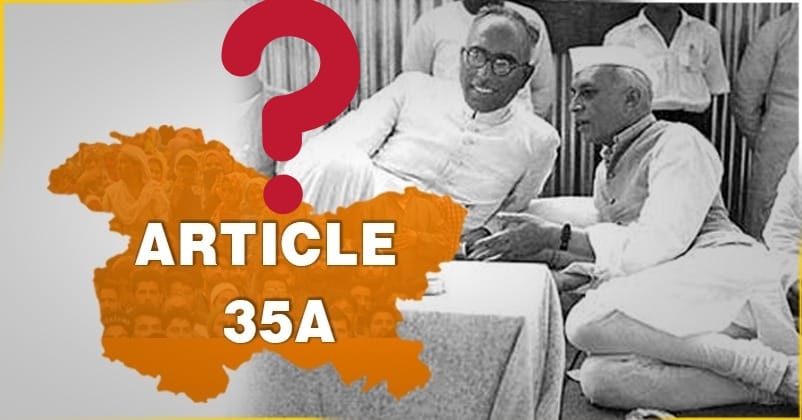| 14-May-2020 |
14th May 1954, Incorporation of unconstitutional Article 35A

Ronik Sharma, Advocate, J&K
Article 35A, a provision fraudulently and mischievously incorporated in the Constitution of India, was unconstitutionally inserted by a presidential order on 14th May 1954, bypassing the Article 368 which empowers only Parliament to amend the Constitution. The then President Rajendra Prasad on the advice of Prime Minister Jawaharlal Nehru cabinet incorporated Article 35A on 14th May 1954.
35 A not only blocked the process of development of erstwhile State of J&K but was also a stumbling block for proper management and governance of erstwhile State of Jammu and Kashmir due to which Jammu and Kashmir became deprived of many developmental projects, industries, and employment. It was not only arbitrary but also discriminatory while clashing with our fundamental rights under Article 14, 19 and 21 of the Indian Constitution.
Article 35A not only prohibited the citizens of India for acquiring immovable properties but also prevented them from seeking employment in the erstwhile State of Jammu and Kashmir. It gave the J&K legislature full discretionary powers to decide who becomes 'permanent resident' of the erstwhile State of Jammu and Kashmir, if a girl from the region marries a person who does not hold a permanent resident certificate of J&K, then she would lose all her property rights making her children too ineligible to claim any property in the region. ‘The permanent resident’ clause not only gave the special rights but also privileges in employment with the state government, acquisition of property in the state, settling in the state, and the right to scholarships and other forms of aid that the state government provided. It also allowed the state legislature to impose any restrictions upon all others, except the permanent residents on aforesaid leisure.
The contents of Article 35A and the abrogation
The West Pakistani refugees who had migrated to J&K during Partition were not treated as "State subjects" even after six decades under the Jammu and Kashmir Constitution. Article 35 A said that “no act of the state legislature that came under it could be challenged for violating the Constitution or any other.” Mostly Dalit Hindu community and the families of Gorkha also became victims of the Article 35A.
The contents of the article 35 A are enunciated as under:-
"Saving of laws with respect to permanent residents and their rights." — Notwithstanding anything contained in this Constitution, no existing law in force in the State of Jammu and Kashmir, and no law thereafter enacted by the Legislature of the State.
(a) defining the classes of persons who are, or shall be, permanent residents of the State of Jammu and Kashmir; or
(b) conferring on such permanent residents any special rights and privileges or imposing upon other persons any restrictions as respects (i) employment under the State Government
(ii) acquisition of immovable property in the State;
(iii) settlement in the State; or
(iv) right to scholarships and such other forms of aid as the State Government may provide, shall be void on the ground that it is inconsistent with or takes away or abridges any rights conferred on the other citizens of India by any provision of this part.
In 1957, people from Dalit Community (Valmikis) were brought to erstwhile State of Jammu and Kashmir from neighbouring State by the then administration. The successive governments in J&K did not provide them, Permanent Resident Certificate (PRC) and denied their wards not to take the opportunity in other government Jobs except they were eligible only for the post of 'sweeper'. Since 1957 their generations were compelled to become sweepers in the Municipal Council of Jammu.
Due to the discriminatory Article of 35A the highly qualified youth of Dalit Community (Valmikis) in J&K did not get any opportunity to become teachers, lawyers, doctors, or engineers.
Thus, Abrogation of Article 35A has today paved way for citizens of India to come freely and establish industries, invest money in Union territory of Jammu and Kashmir and also participate in the developmental process of the Union territory of Jammu and Kashmir. Now, the west Pakistani refugees will also get all the benefits that they were not getting earlier.
Women of J&K will not be deprived of their rights and no gender discrimination will be seen. The wards of the Dalit Community (Valmikis) and Gorkhas will also get equal opportunity in case of jobs and other social benefits which they were denied earlier. Thus, ushering a new era of development and prosperity of this deprived region, the removal of Article 35A for the people of Union territory of Jammu and Kashmir will be immensely benefited in terms of employment in private industries, the agricultural Sector. Jammu and Kashmir will become the hub of trade and tourism activities and will also boost the economy of the Union Territory of J&K and it would be a big leap towards self-reliance.